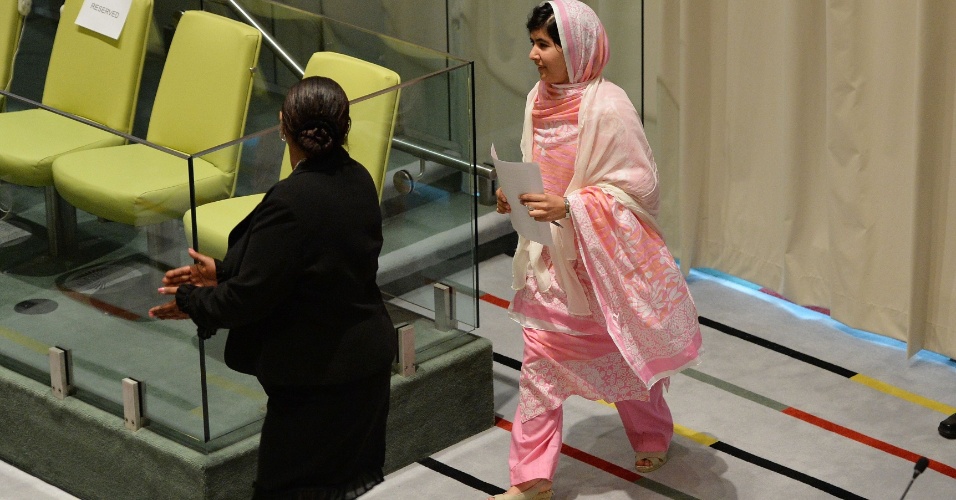
Image Credit: educacao.uol.com.br
Malala Yousafzai requires no introduction, especially not now that the United Nations has recognized her birthday as “Malala Day,” celebrating this girl from Swat Valley, Pakistan, who has such a strong desire for knowledge that even a bullet to the head could not waiver. Addressing the United Nations on her 16th birthday, Malala said: “[t]he wise saying, ‘The pen is mightier than sword’ was true. The extremists are afraid of books and pens. The power of education frightens them. They are afraid of women. The power of the voice of women frightens them. And that is why they killed 14 innocent medical students in the recent attack in Quetta. And that is why they killed many female teachers and polio workers in Khyber Pukhtoon Khwa and FATA. That is why they are blasting schools every day. Because they were and they are afraid of change, afraid of the equality that we will bring into our society.”
It is this sentiment that was carried throughout Pakistan the day Malala was shot. Newspapers and social media websites were flooded with cartoons and caricatures depicting the Taliban running scared from little girls holding school-bags. That day in the U.N. Assembly, Malala embodied all those she looks up to, wanting no revenge from those who had hurt her, because “[t]his is the compassion that I have learnt from Muhammad-the Prophet of mercy, Jesus Christ and Lord Buddha.”
But this was not the compassion the Taliban had learned at all. In a letter addressed to Malala, Adnan Rasheed, a member of the Pakistani version of the Taliban (known as the Tehreek-i-Talibaan Pakistan or the TTP), an escaped convict and previously a member of the Pakistan Air Force, told Malala that when he read her posts in the BBC on how the Taliban were hindering her efforts to receive an education, he wanted to warn her of the repercussions, fearing an “accident” such as the attack on her befall.
But the Taliban, Rasheed clarifies, had not attacked Malala because she was an “education lover” but because she was running a “smearing campaign to malign their efforts to establish Islamic system in Swat and your writings were provocative.” He went on to say that Malala’s thirst for knowledge ought to be for learning about Islam because “a noble and pious teacher with prophetic curriculum can change the world not with satanic or secular curriculum,” seemingly quoting the same Prophet Malala referred to as the prophet of mercy in her speech.
How is it that two people can interpret the same person so very differently? There is a saying of Prophet Muhammad that asks people to “seek knowledge, even if you should have to go as far as China.” On that basis alone, if we agree with Rasheed that “knowledge” is by definition restricted to religious teachings, why was the Prophet, “the pious teacher,” himself in Arabia, sending his people to China to seek knowledge?
Mohammed Hanif, Pakistani writer and journalist, wrote a response to Rasheed’s letter in the Guardian, and reminded Rasheed that the Prophet advocated eradication of cultural norms such as female infanticide, a practice rampant in Arabia to silent the girls before the advent of Islam. He equated their shooting of Malala and her classmates as their attempt to silence the girls of today.
Hanif goes on to clarify: “There was only one lesson to be learned: you can fight the Pakistani army; you can try and almost kill Pakistan’s commander-in-chief, as you so heroically did; you might wage a glorious jihad against brutal imperial forces. But you can’t pick a fight with the working women in your neighbourhood and hope to win. Those women may never get an audience at the UN but everyone – from cotton picker to bank teller – cannot be asked to shut up and stay home, for the simple reason that they won’t.”
So, while Rasheed and the Taliban are furious that Malala is maligning their efforts to establish an “Islamic system” in Swat; Malala, Hanif and I, like many Muslims, are furious that the Taliban are running a smearing campaign against the true essence of Islam.
“Four things support the world: the learning of the wise, the justice of the great, the prayers of the good, and the valor of the brave,” said the Prophet of mercy, just as Malala reminded her audience at the United Nations that: “[t]he terrorists thought that they would change our aims and stop our ambitions but nothing changed in my life except this: Weakness, fear and hopelessness died. Strength, power and courage was born.”
In October last year, I wrote about joining the world in prayer for Malala Yousafzai’s speedy recovery. Today, I ask you join me in prayer for heroic children such as Malala who has inspired new cartoon superheroes in Pakistan and all those who are struggling to achieve their goals of education, peace and equality, and for those who have fallen victim to terrorists activities. And for the Taliban, that they understand the true peaceful message of Islam.